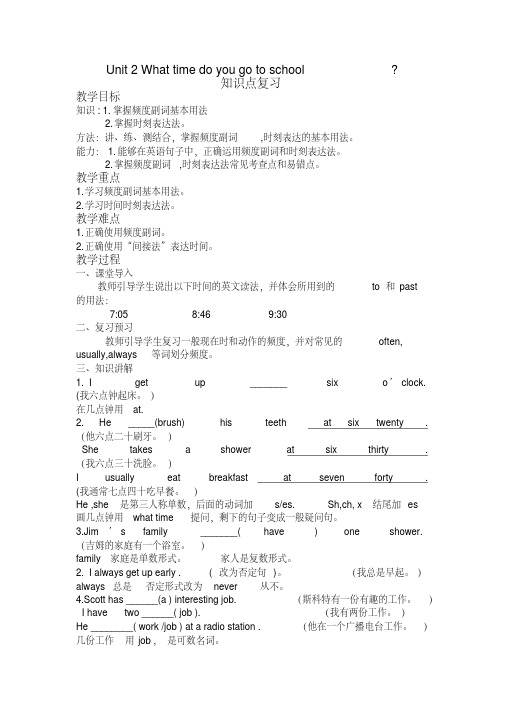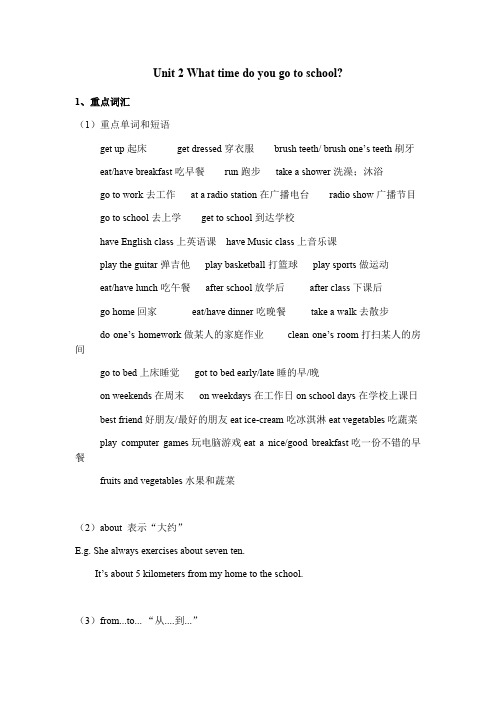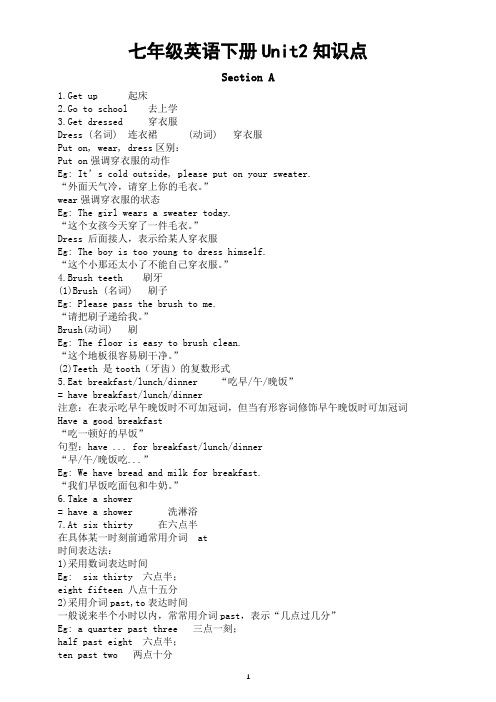七年级英语下册Unit2Whattimedoyougotoschool要点详解素材1人教新目标版
人教七年级下册Unit2Whattimedoyougotoschool知识点总结

_______( have
)
one
shower.
(吉姆的家庭有一个浴室。 )
family 家庭是单数形式。
家人是复数形式。
2. I always get up early .
( 改为否定句 )。
(我总是早起。 )
always 总是 否定形式改为 never 从不。
4.Scott has ______(a ) interesting job.
and_____________(vegetable )
for lunch.
(十二点钟,她午餐吃许多水果和蔬菜。 )
许多 a lot of = lots of
可数不可数都可以用。
much 修饰不可数名词
many + 可数名词的复数形式。 )
20. After lunch , she sometimes ______(play ) volleyball.
do 是助动词,两个 do 都不能去掉。
用了 does, 后面的动词用原形。
18. I _____watch TV or play computer games in the evening .
(我晚
上要么看电视要么玩电子游戏。 )
Either you or he ________(clean ) the classroom.
for breakfast .
Don ’ t have = have no 没有。
时间 time 是不可数名词名词。
( 我没有许多时间吃早餐。 )
15. He eats a ________(good ) breakfast .
( 他吃好的早餐。 )
I play ping-pong _______(good ).
Unit2Whattimedoyougotoschool单元知识点人教版七年级英语下册

七年级英语下册Unit 1知识点人教版七下 Unit 2 What time do you go to school?单元知识梳理【Useful expressions】1.what time 几点2.go to school 去上学3.get up 起床4.take a shower 洗淋浴5.brush teeth 刷牙6.get to 到达7.do homework 做家庭作业8.go to work 去上班9.go home 回家10.eat breakfast 吃早饭11.get dressed 穿上衣服12.get home 到家13.either…or…要么…要么…14.go to bed 上床睡觉15.in the morning/afternoon/evening 在上午/下午/晚上16.take a walk 散步17.lots of=a lot of 许多,大量18.radio station 广播电台19.at night 在晚上20.be late for=arrive late for 迟到21.be good for…..对…….有益22.taste good 尝起来好23.do her homework 做她的家庭作业24.have a healthy life 有一个健康的生活方式25.have dinner 吃晚饭26.after that 在那之后27.get home from school 放学回家28.half an hour 半个小时29.live a healthy life 过健康的生活【Target sentences】1.—What time do you usually get up?— I usually get up at six thirty.2.— What time does Rick eat breakfast?—He eats breakfast at seven o’clock.3.— When does Scott go to work?—He always goes to work at eleven o’clock.4.What time do they get dressed?They always get dressed at seven twenty.5.When do your friends exercise?They usually exercise on weekends.6.I don’t have much time for breakfast, so I usually eat very quickly.7.I either watch TV or play puter games.8.At twelve, she eats lots of fruit and vegetables for lunch.9.She knows it’s not good for her, but it tastes good!10.After school, I sometimes play basketball for half an hour.【Language points】1.get dressedget dressed 穿上衣服【用法详解】get dressed为固定短语,表示穿的动作。
人教版七下 Unit 2 What time do you go to school?知识点总结

Unit 2 What time do you go to school?必背短语get up 起床 get home到达家中 get to work到达工作岗位 make breakfast做早饭make a shower schedule做一个洗澡的安排 practice guitar 练吉它 leave home 离家take a shower = have a shower 洗淋浴澡 take the Number 17 bus to the Hotel 乘17路公共汽车去旅馆go to class 上课 go to school 上学 go to work 上班(反义词 go home)have breakfast/dinner/lunch吃早晚午饭put on 穿衣服(反义词take off) do one’s homework 做家庭作业tell sb. about sth. 告诉某人某事 tell sb. to do sth. / tell sb. sth.know about sth. 知道某方面的情况 love to do/doing = like to do/doing 喜欢干某事listen to the early morning news on radio 听电台早间新闻 listen to 听…watch the early morning news on TV 看电视早间新闻around six o’clock 六点左右 in the morning 在早上 in the afternoon 在下午 in the evening 在晚上考点解析※get up 起床 eat breakfast=have breakfast 早餐(三餐前省略冠词)have三餐吃…..※job与 work job与 work 都是指工作,但job是可数名词,work是不可数名词. a job 一份工作 work 可以做动词讲,但是job不可以※Life 生活 lives (复数) health健康 healthy健康的 healthily健康地unhealthy 不健康的 keep health 保持健康 healthy food 健康食品have a healthy life =live a healthy life 过着健康的生活※3个穿的区别:wear 表状态,接服装、手套、眼镜、香水等 put on 表动作,接服装dress 表动作,接sb/ oneself get dressed穿衣语法精讲1,问时间what time或者when what time询问具体时间(几点几分) when:时间、日期、年份、月份等提问2,take a shower=have a shower 沐浴3,at a radio station 在广播电台 from……to ……从……到…..(连接两个时间或地点)4,be/ arrive late for :迟到 be late for school5,exercise 锻炼,练习(动、不可数名词) do/take exercise 做锻炼(运动)6,频度副词(实意动词前;be动词后)Always usually often sometimes seldom hardly never★下面的排列更直观地说明了这几个词的频率的"大小"。
七年级英语下册Unit2 What time do you go to school-重要知识点汇总

七年级英语下册Unit2 What time do you go to school?重要知识点汇总七年级英语下册Unit2 hat tie d u g t shl?重要知识点汇总【重点单词】up [>p] adv 向上get up 起床;站起dress [dres] v 穿衣服n 连衣裙get dressed 穿上衣服brush [br>ʃ] v 刷n刷子tth [tuːθ] n (pl teeth [tiːθ] ) 牙齿sher [‘ʃa<ə] n ≈ v 淋浴n 淋浴器(间)tae a sher 洗淋浴usuall [‘u:Duəli] adv 通常地;一般地frt [‘f`:(r)ti] nu 四十[a<] inter(表示惊奇或敬佩)哇;呀never [‘nevə(r)] adv 从不;绝不earl [‘ɜːlɪ] adv ≈ ad 早(的)fift [‘fɪftɪ] nu 五十b [dD^b], [dDɑːb] n工作;职业r [ɜː] v ≈ n 工作statin [‘steɪʃn] n 电(视)台;车站radi statin 广播电台‘l [ə’l^], [ə’lɑ:] adv(表示整点)……点钟night [naɪt] n 晚上;夜晚funn [‘f>nɪ] ad奇怪的;滑稽好笑的exerise [‘esəsaɪz] v ≈ n 锻炼;练习n eeends (在)周末best [best] ad 最好的adv 最好地;最grup [gruːp] n 组;群half [hɑːf], [hæf] n ≈ prn 一半;半数past [pɑːst], [pæst] prep 晚于;过(时间)ad 过去的quarter [‘`ː(r)tə(r)] n一刻钟;四分之一her [‘hə<ɜː(r)] n 家庭作业d (ne’s) her 做作业run [r>n] v 跑;奔lean [liːn] v 打扫;弄干净ad 干净的al [`ː] n ≈ v 行走;步行tae a al 散步;走一走quil [‘ɪli] adv 很快地either [‘aɪðə(r)], [‘iː ðə(r) ]adv 或者;也(用在否定词组后)either…r … 要么……要么……;或者……或者……lt [l^t], [lɑ:t] prn 大量;许多lts f 大量;许多seties [‘s>taɪz] adv 有时taste [teɪst] v 有……的味道;品尝n味道;滋味life [laɪf] n 生活;生命【重点短语】1 g t shl 去上学2 get up 起床3 get dressed 穿衣服4 brush teeth 刷牙eat breafast 吃早饭6 tae a sher 洗澡7 hat tie 什么时间8 at six frt 在六点四十9 an interesting b 一个有趣的工作10 at the radi statin 在广播电视台11 usuall /alas/ ften/ seties/ never 经常/总是/经常/有时/从不12 ur radi sh 你的广播节目13 fr …t 从…到…14 at night 在夜晚1 a funn tie 一个有趣的时间16 tae exerise 锻炼17 be late fr… 因… 迟到18 at abut ten tent 在大约十点二十19 n eeends 在周末20 n shl das 在上学日21 half past six 六点半22 a quarter past three 三点过一刻(3:1)23 a quarter t ten 十点差一刻(9:4)24 d (ne’s)her 做(某人的)家庭作业2 tae a al 散步26 g t bed 睡觉27 eat quil 吃得快28 have uh tie 有许多时间29 half an hur 半个小时30 get he 到达家31 either…r 或者……或者32 eat a gd breafast 好好吃顿早餐33 lts f = a lt f 许多34 be gd fr… 对……有益3 taste gd 尝起好36 d her her 做她的家庭作业37 have a health life 有一个健康的生活方式38 have dinner 吃晚饭【重点句型】1 hat tie d u g t shl?你几点去上学?2 一hat tie d u usuall tae a sher,i?瑞克,你通常几点钟淋浴?—I usuall tae a sher at six frt我通常六点四十淋浴。
七年级英语下册Unit2Whattimedoyougotoschool知识点总结(最新整理)

I. 词汇 A) 根据英语释义及首字母提示,完成下列单词拼写。 1. S______ (the last day of a week) 2. o______ (of the clock) 3. h______ (the work a teacher gives a student to do at home) 4. l______ (not early) 5. m______ (time before noon) B) 根据首字母或汉语提示完成各句所缺单词 6. What t______ do you usually get up? 7. I like watching movies (看电影) with my b______ friend. 8. School s______ at nine o’clock. 9. I u______ go to school at half past seven o’clock.
(8)be good for... “对...有好处” be bad for “对...有坏处” E.g. Fruits and vegetables are good for your health.
Eating much ice-cream is bad for your health. (9)be late for.... “迟到...”
E.g. I often play sports before breakfast. Mr. Li usually takes a walk after dinner.
(6)much;many;lots of/ a lot of 都表示“许多”; 区分:much+不可数名词; many+可数名词复数;lots of/ a lot of+可数名
初中英语人教版七年级下Unit 2 What time do you go to school知识点

七年级英语下册Unit2知识点Section A1.Get up 起床2.Go to school 去上学3.Get dressed 穿衣服Dress (名词) 连衣裙 (动词) 穿衣服Put on, wear, dress区别:Put on强调穿衣服的动作Eg: It’s cold outside, please put on your sweater.“外面天气冷,请穿上你的毛衣。
”wear强调穿衣服的状态Eg: The girl wears a sweater today.“这个女孩今天穿了一件毛衣。
”Dress 后面接人,表示给某人穿衣服Eg: The boy is too young to dress himself.“这个小那还太小了不能自己穿衣服。
”4.Brush teeth 刷牙(1)Brush (名词) 刷子Eg: Please pass the brush to me.“请把刷子递给我。
”Brush(动词) 刷Eg: The floor is easy to brush clean.“这个地板很容易刷干净。
”(2)Teeth 是tooth(牙齿)的复数形式5.Eat breakfast/lunch/dinner “吃早/午/晚饭”= have breakfast/lunch/dinner注意:在表示吃早午晚饭时不可加冠词,但当有形容词修饰早午晚饭时可加冠词Have a good breakfast“吃一顿好的早饭”句型:have ... for breakfast/lunch/dinner“早/午/晚饭吃...”Eg: We have bread and milk for breakfast.“我们早饭吃面包和牛奶。
”6.Take a shower= have a shower 洗淋浴7.At six thirty 在六点半在具体某一时刻前通常用介词 at时间表达法:1)采用数词表达时间Eg: six thirty 六点半;eight fifteen 八点十五分2)采用介词past,to表达时间一般说来半个小时以内,常常用介词past,表示“几点过几分”Eg: a quarter past three 三点一刻;half past eight 六点半;ten past two 两点十分半小时过后多用介词to,表示“差几分到几点”Eg: a quarter to three 两点四十五;twenty to four 三点四十3)a. m. 和p. m.A.m. 表示“午前;上午”(午夜12:00后至中午12:00前);p.m. 表示“午后;下午”(中午12:00后至午夜12:00前)。
七年级英语下册Unit2Whattimedoyougotoschool重点归纳笔记(带答案)

七年级英语下册Unit2Whattimedoyougotoschool重点归纳笔记单选题1、—I'm going home now.—Me ________.A.tooB.alsoC.eitherD.as well as答案:A句意:——我现在要回家了。
——我也是。
考查副词辨析。
too也,用于肯定句句末;also也,用于肯定句句中;either也,用于否定句句末;as well as 和。
此空位于肯定句句末,故选A。
2、Victor has a relaxing ________. He doesn’t have a lot of ________ and he only ________ on weekends. A.work; works; worksB.work; work; workC.job; work; worksD.job; works; work答案:C句意:维克多有一份轻松的工作。
他没有很多工作,他只在周末工作。
考查词汇辨析。
job工作,可数名词;work工作,不可数名词或动词。
根据“a relaxing ...”可知第一空用可数名词单数job;再由“a lot of”可知第二空用可数名词复数形式jobs或不可数名词work;根据“he only ... on weekends”可知第三空是个谓语动词,he后用work的第三人称单数形式works。
故选C。
3、They got dressed ______ half past six ______ the morning.A.in; onB.on; inC.at; inD.in; at答案:C句意:他们早上六点半就穿好衣服了。
考查介词辨析。
in用于一天中上午、下午或晚上等;on用于具体某一天;at用于具体时刻前。
句中“half past six”表示“具体时刻”,前面使用介词at;句中“the morning”表示“早上”,前面使用介词in。
whattimedoyougotoschool知识点

【Hold fast to dreams. They will come true one day!紧紧抓住梦想,总有一天梦想会成真。
】初一英语(下)Unit2 What time do you go to school一、热点、考点回顾1.重点短语:what time几点,什么时候 go to school去上学 get up起床 take a shower淋浴,洗澡put on穿上 go to work去上班 get to到达 listen to听 get back 归还,取加get home 到家 get go 到达 get for 为某人拿(取)买 get from 从某人/某物那得到……go to bed上床睡觉 get dressed穿上衣服 radio station广播电台 do homework做作业go home回家 lots of=a lot of许多;大量2.口语:(1)What time is it 几点了(2)--What time do you usually get up你通常几点起床--I usually get up at five o’clock. 通常5点钟起床。
(3)--What time does he eat breakfast他什么时候吃早饭--He eats breakfast at seven o’clock. 他七点钟吃早饭。
3.语法知识:对时间提问:What time与when都可以用来提问时间,表示“什么时候”。
提问做某事的具体时间(钟点)时,一般两者可通用;提问事件发生的年份、月份、日期等非钟点性时间时只能用when,而不能用what time。
--What time/When does your mother go to work你母亲什么时候去上班--She goes to work at seven.她7点去上班。
--When will he come back他什么时候回来--He’ll come back tomorrow.他明天回来。
- 1、下载文档前请自行甄别文档内容的完整性,平台不提供额外的编辑、内容补充、找答案等附加服务。
- 2、"仅部分预览"的文档,不可在线预览部分如存在完整性等问题,可反馈申请退款(可完整预览的文档不适用该条件!)。
- 3、如文档侵犯您的权益,请联系客服反馈,我们会尽快为您处理(人工客服工作时间:9:00-18:30)。
Unit 2 What time do you go to school? 要点详解
1. What time do you usually get up? I usually get up at six thirty.
They usually eat dinner at a quarter to seven in the evening.
He usually gets up at half past six in the morning.
时间表达法:
(at+具体时间点“在几点钟”) (at+时钟+分钟“在几点钟”)
(half past+时钟(基数词) “…点半” ; a quarter to+时钟(基数词) “差一刻到…点” )
(分钟+past+时钟(基数词) “…点过…分”; 分钟+to+时钟(基数词) “…点差…分” ) 2.When do students usually eat dinner? what time 和 when 的区别:
①询问具体的时间,两者都可以使用.
When do you get up?=What time do you get up?
②询问钟表表示的时间只能用what time,
What time is it now?=What’s the time now? It’s seven thirty.
③询问时间段只能用when。
When do you watch TV? I watch TV in the evening.
3.In the evening, I either watch TV or play computer games. (either…or… ) either…or… 用法简介:主要用于表示选择,其意为“或者…或者…”,用于连接两个性质相同的词或短语。
特别提醒:either…or…连接两个成分作主语时,谓语动词通常与其靠近的主语保持一致,就是我们常说的就近原则。
4.At twelve, she eats lots of fruit and vegetables for lunch.
(lots of+ 可数名词复数/不可数名词“许多,大量…”)
1。
